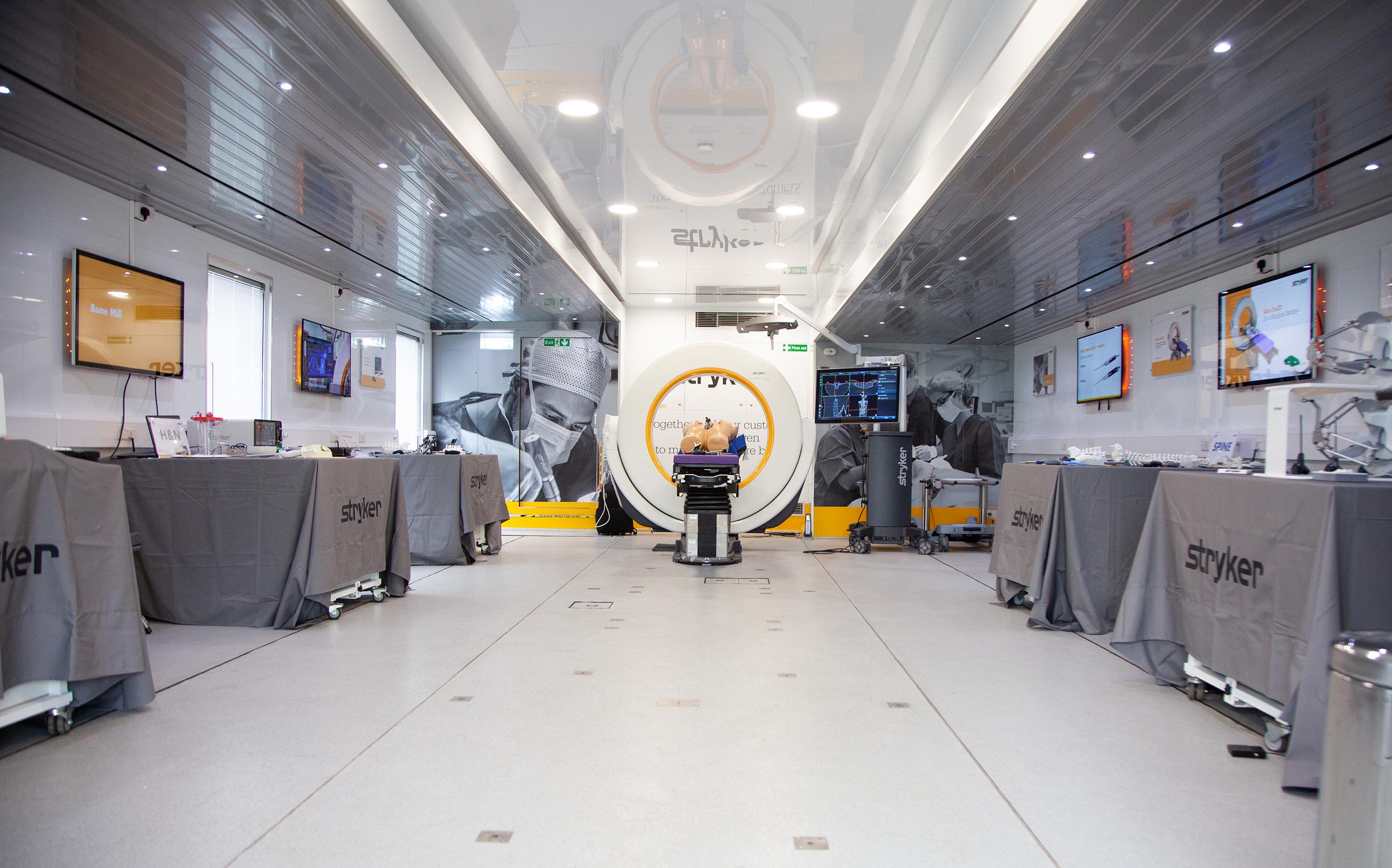Innovative open surgery training on campus.
State-of-the-art surgical technology is provided for one day as a training site at Magdeburg University Medical Center
On December 1, 2022, from 9 a.m. to 6 p.m., a simulation OR for spine, spinal cord, head and brain surgery will be made available by the company Stryker GmbH & Co.KG for training and educational purposes on the grounds of Magdeburg University Medical Center. The focus of the event is the education and training of physicians, students and surgical staff from the fields of neurosurgery, otolaryngology, oral and maxillofacial surgery, orthopedics and trauma surgery. Participants can familiarize themselves with new technical instruments for minimally invasive surgical techniques. Spine surgery procedures and techniques will be presented and procedures will be simulated. The aim is to further improve surgical results for patients. The event is organized by the University Department of Neurosurgery under the direction of Department Director Prof. Dr. Erol Sandalcioglu. Among the main organizers are resident Nikolay Tonchev and senior physician Dr. Karl Hartmann. Interested physicians, students and specialists from the operating rooms and also from the surrounding clinics are welcome to register under

Photo: Stryker truck
Author: Stryker GmbH & Co.KG
"In this 7.5-ton truck from the Stryker company equipped with modern surgical technology, the entire surgical team can use anatomical models to practice simulated surgical situations in the SkillsLab at a very low threshold. The basic principle and goal in the development of new technologies is to spare functionally important structures and to treat patients with a high degree of safety and effectiveness," says Karl Hartmann, MD.
Prof. Sandalcioglu adds: "Medical care in neurosurgery is characterized by a high degree of mechanization. This affects the entire team in a modern neurosurgical operating room. Therefore, it is particularly important to stay informed about new developments and innovations and to provide regular training for both physicians and medical staff. The cornerstone of any successful surgery is a team that works well together."
What: Stryker Neurotech Mobile Experience at location
When: 1. December 2022 von 9-18 Uhr- Hands on Sessions; 10 Uhr - Vortrag
Where: The grounds of Magdeburg University Medical Center
Parking lot of the German Center for Neurodegenerative Diseases (DZNE)
Media representatives are cordially invited to attend the event from 11 a.m. to 1 p.m. to report on the event or to take photos and film it. Prior registration at is requested.
Intelligent assistance functions make microsurgical work enormously easier and even more precise. Since 2021, for example, the University Department of Neurosurgery has been working with the state-of-the-art Kinevo 900 surgical microscope from Zeiss. The built-in robotics support the surgeon by automatically controlling the microscope, thereby immediately providing precise viewing from many perspectives. "With the integrated micro-inspection tool, you can now even see around the corner and thus look behind vessels and nerves, for example. This is very important to make sure that no other important structures are affected," Prof. Sandalcioglu points out some of the microscope's new features. "The microscope enables the implementation of functional and structural brain analyses using augmented reality, which are not visible to the naked eye," explains Dr. Karl Hartmann about his research area. Furthermore, special contrast agents can be used to visualize the blood flow in vessels and the boundaries between tumor tissue and healthy tissue. "This gives us even more certainty in our decisions about which and how much tissue ultimately needs to be removed. Operating such a microscope requires very intensive training and extensive knowledge," says the neurosurgeon.
Previously, the research team validated innovative imaging techniques for neurosurgical guidance, such as intraoperative microscope-integrated OCT technology. This is based on the detection of backscattered near-infrared light. It is therefore harmless to biological tissue and features precise spatial resolution.
Neurosurgery uses surgical methods to treat diseases of the spine and nervous system. These include, for example, tumors within the skull or spine, vascular diseases, malformations, injuries to the brain, spinal cord and nerves.
Neurosurgery uses computer-assisted targeting systems with which circumscribed areas of the brain can be precisely localized by probes. In addition to magnetic resonance imaging (MRI) and computed tomography (CT), imaging of the cerebral vessels (cerebral angiography) and MRI-assisted neuronavigation are used in neurosurgical diagnostics and therapy.
Contact person on site:
- Karl Hartmann, MD, University Department of Neurosurgery
- Resident Nikolay Tonchev, University Hospital for Neurosurgery
- Heiko Pawils, Sales Representative Head & Neck, Neurosurgical, Company Stryker GmbH & Co.KG
- Julia Steinicke, Sales Representative Head & Neck, Craniomaxillofacial, Company Stryker GmbH & Co.KG
A training note for interested parties:
In the Department of Neurosurgery, an open neurosymposium is held every two weeks as an official continuing education event of the Medical Association, which is dedicated to complex interdisciplinary disease patterns of the neurological spectrum in thematic blocks. For example, the next block will deal with complex surgery in the area of the pituitary gland and frontal skull base. The working group is pleased to have attracted renowned speakers such as Prof. R. Fahlbusch from the International Neuroscience Institute Hannover and Prof. A Goel from the King Edward Memorial Hospital, Mumbai.. Weitere Informationen zur Fortbildung.
Interested parties can attend the symposium in attendance or as a guest.






